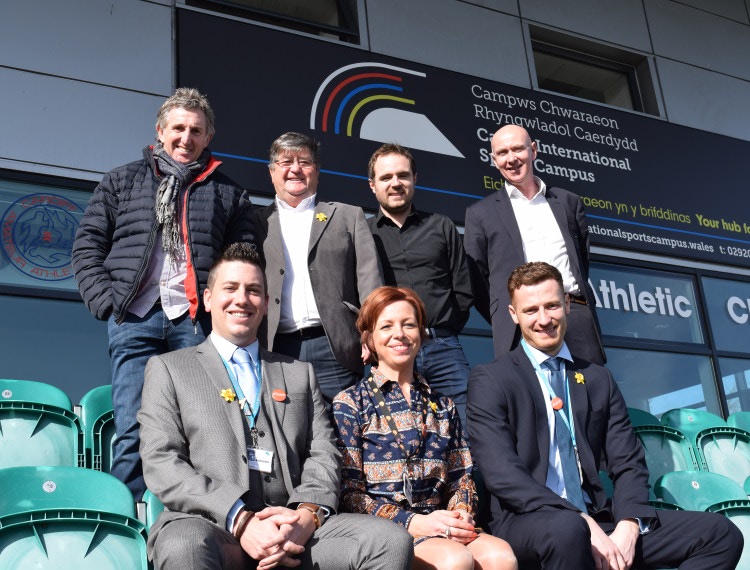Cardiff and Vale College hosts conference to boost bilingualism in the world of sport

Household names from the world of sport came to a special conference at Cardiff and Vale College to highlight the benefits speaking Welsh have for young people trying to get into the industry.
Rugby legend Jonathan Davies OBE, renowned Welsh-language commentators Huw Llewelyn Davies and Owain Llyr and FAW Head of Public Affairs Ian Gwyn Hughes spoke at the Bilingualism in Sport Conference. Held as part of CAVC’s Welsh Week to mark St David’s Day, the event was supported by Colegau Cymru and the Welsh Government, and was designed to highlight how bilingualism can boost employability.
More than 80 students from six colleges across South Wales attended the conference, held at CAVC’s state of the art Cardiff International Sports Stadium in Leckwith. The young people from CAVC, Coleg Gwent, Coleg Sir Gar, Coleg y Cymoedd and Gower College Swansea were greeted in a bilingual address by CAVC Governor Iestyn Morris. The College’s Creative students then performed hits by Welsh bands and the national anthem.
The Sports learners then attended a presentation on a 35-year career in broadcasting and rugby commentating from Huw Llewelyn Davies. Afterwards, sports journalist and football commentator Owain Llyr set them the challenge of writing and delivering a 40-second match report based on Wales’ historic win against Belgium in the Euro 2016 quarter finals.
“I think this conference is a great idea,” Owain Llyr said. “When I was a student I was never involved in anything like this or even offered anything like this – I wish I had been.
“Hopefully it will encourage some of the students to give sport reporting or working in the industry a go when they are older.”
Huw Llewelyn Davies said: “This conference is very important in the context of making people aware that there are two languages and that there is full coverage of sport in Welsh through the medium of radio, television and online as well. Having worked for the BBC for 35 years I found people were initially reluctant to accept the Welsh channels, including the public.
“However, gradually, over the years, it has become accepted as the equivalent of English language broadcasting. We are lucky in rugby that so many of the players speak Welsh so if young people see their role models speaking Welsh, well, that is ‘cool’ to them.”
FAW Head of Public Affairs Ian Gwyn Hughes gave a presentation about how the FAW works to embed a sense of Welsh history and culture in the Wales team, and how Welsh has become an accepted language in international football. He pointed to the 2016 Euros where Adidas tweeted in Welsh and Owain Llyr asked the first ever question in Welsh at an international football press conference.
“It’s exciting to have this conference – we found during the Euros that when we made use of bilingualism we got such a positive response,” Ian said. “It showed that our language, history and culture set us apart.
“In the Euros, Welsh was used as naturally as English, Spanish or German was used. If a lesson is to be learned from that it is not to be embarrassed by your Welsh – have confidence in using it in whatever you do.”
After a practical session with Dan Gwyn Hughes and the Urdd came the keynote session with Jonathan Davies OBE. He spoke of his career in international rugby and gave a rallying cry to those who were learning Welsh or not confident in their bilingual skills.
“The most important thing is that people are comfortable in their Welsh and conferences like this could help,” Jonathan said. “If someone doesn’t think their language is any good and think they will get criticised for it they should not – if you are trying to learn a new language keep trying, keep putting the English in if you can’t think of the Welsh. Just keep trying.
“For me trying as hard as you can is not going to hinder you in any way and it could be beneficial. Being bilingual certainly will not interfere with your career – we have got two radio stations and a lot of independent broadcast companies who all use the Welsh language.”
CAVC Head of Sport, Public Services and Academies James Young said: “A career in sport is a career in the heart of the community as sport plays such an important part in the lives of so many people. It’s important that the Welsh language is utilised to encourage as many people as possible to take engage in sport from taking part to watching it on television or following it on the radio.
“There is also another side – being bilingual in Welsh has been shown to boost employability for young people. The Welsh Government has identified the sport and leisure industry – one of the fastest growing sector in Wales – as a priority area where demand for bilingual employees is on the increase.”
About CAVC
- in 2016 CAVC won the prestigious UK-wide Association of Colleges Beacon Award for its innovative and sector leading apprenticeship provision
- Cardiff and Vale College is one of the top companies for Equality, Diversity and Inclusion in the National Centre for Diversity’s 2016 Top 100 Index. It has also been awarded the National Centre for Diversity’s Award for Welsh FE College of the Year 2016
- CAVC was shortlisted for the TES College of the Year Award 2017
- Cardiff and Vale College was awarded College of the Year at the 2015 and 2016 Insider Business and Education Partnership Awards
- Apply now to join CAVC in Sept 2017
- Why not follow the latest updates from Cardiff and Vale College on Facebook.com/CardiffandValeCollege, Instagram @cavcinsta or Twitter @cavc












Responses